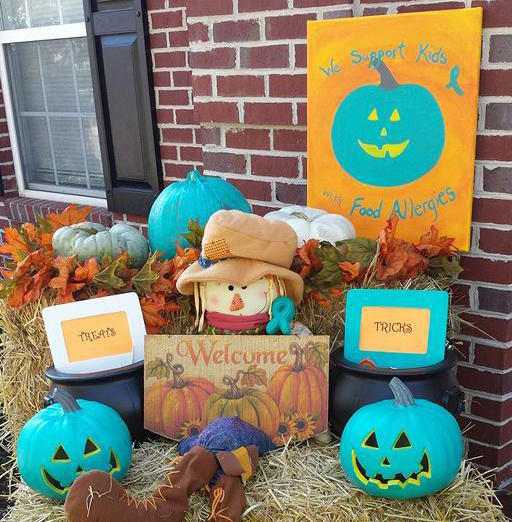Most families coping with food allergies know that a teal pumpkin signals a safer Halloween. Kids with food allergies can celebrate Halloween with crafts, parties and more. But did you also know that the support group that launched the craze started it as part of its education and advocacy program?

What is Project Teal?
Project Teal is an education, awareness and advocacy effort of the Food Allergy Community of East Tennessee (FACET). FACET is a support group affiliated with the Asthma and Allergy Foundation of America (AAFA). Becky Basalone founded FACET in 2012.
That year, Becky and her two sons painted a pumpkin with teal paint, the color of food allergy awareness. As the pumpkin idea grew and spread over the past couple of years, FACET grew too.
It is now its own nonprofit organization, which means that it can accept donations. In addition, the group can apply for its own funding and grants. It has a board of directors and several active regional chapters in the eastern half of the state. Becoming a nonprofit allows them to focus money on local projects.
“We have a lot of local support here,” said Becky.
Project Teal first started as a "virtual" chapter, where people from rural parts of the state or even other parts of the U.S. could go for help.
"We do what we can from where we are to help them, and that’s where Project Teal was born, so that we could have more of an impact on other areas besides just East Tennessee,” Becky said.
Supporting Stock Epinephrine in Tennessee
The passage of Tennessee's stock epinephrine law in 2013 started the education and awareness efforts of Project Teal. Stock epinephrine lets a school staff member give life-saving medication to any student having a severe allergic reaction, or anaphylaxis.
Project Teal leaders let school nurses know about the law, especially in rural areas, Becky said.
"When the legislature passed that law, we felt a great need to expand our efforts to raise awareness of the fact that the law was in place and that stock epinephrine is available," she said. "And the best way that we could go about that was to contact school nurses and really get to all of them in rural communities."
Rural communities have certain challenges, she said. Long-held traditions and culture around food and activities have deep roots.
“You have to break through that in the best possible way that you can,” Becky said. The best way is through education, by pointing the community to various resources, she added.
Another challenge is that there is little funding to put in place new rules. So FACET tells rural schools about programs that provide free stock epinephrine.
Making a Big Impact
FACET leaders have strong community networks. They work with parents and troubleshoot school issues. Once a year, they hold Section 504 workshops. Sometimes they locate various social services for families.
Group leaders help new members learn what they need to know so that they can advocate on behalf of their own children, Becky said.
Other Advocacy Priorities
FACET is spreading the word about a Congressional effort to improve airline safety for people with food allergies. (You can sign up to support the Airline Access to Emergency Epinephrine Act here.)
FACET also encourages people to make sure that they know to ask for paramedics if they have to call for 911. Ambulances may take 15 minutes or more to arrive in rural areas. Basic life support squads may arrive without epinephrine.
Becky continues her work with FACET even as her youngest child has outgrown most of his food allergies, except for tomatoes. Becky herself carries epinephrine auto-injectors for tree nuts and tomatoes.
If you live in or near Tennessee, you can contact Becky and her team here.


Comments (0)